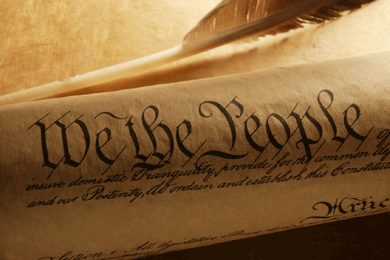|
Article I
Article I calls for a Congress made up of a Senate and a
House of Representatives. it says how Congress shall be elected
and organized. it also says what Congress's duties shall be
shall be and the relationship between Congress and the states.
- Congress was forbidden to end the slave trade until at
least 1808
- Powers given to Congress are focused on taxes,
regulation of commerce, declaring war and creating a
military.
- The "elastic" or "implied powers" clause allows for the
expansion of powers in situations the framers could not
foresee.
- Section 10 takes powers away from the states which they
had under the Articles of Confederation.
|
Article II
Article II creates the executive branch of the national
government. it explains what the president's duties and powers
are. it explains what will happen if the president dies or is
removed from office.
- The president shall be elected by electors chosen by
each state. The Electoral College is all of the electors.
- The president has the power to appoint all judges of the
federal courts.
|
Article III
Article III says that one Supreme Court will head the
judicial branch.
- Judges serve for life as long as they commit no crime.
- Congress has the power to set up lower federal courts as
needed.
- Judicial power comes to be defined by 4th Chief Justice
john Marshall in 1803 as the power of judicial review = the
power to interpret the law.
Article III also defines reason, the act of betraying the
country. |
|
Article IV
Article IV establishes the relationship between the states.
- Congress has the power to form new states
- A slave who escapes to a state that outlaws slavery must
be returned to his or her owner if requested.
|
Article V
Article V explains the two ways the Constitution can be
amended or changed. Using either method, 3/4s of the states must
vote in favor of the amendment for it to pass. |
Article VI
Article VI states:
- The debts of the previous national government must sill
be paid.
- The Constitution is the supreme law of the land
- All federal and state officials must take an oath of
allegiance to the Constitution. But public officials cannot
be required to follow a particular religion.
|
